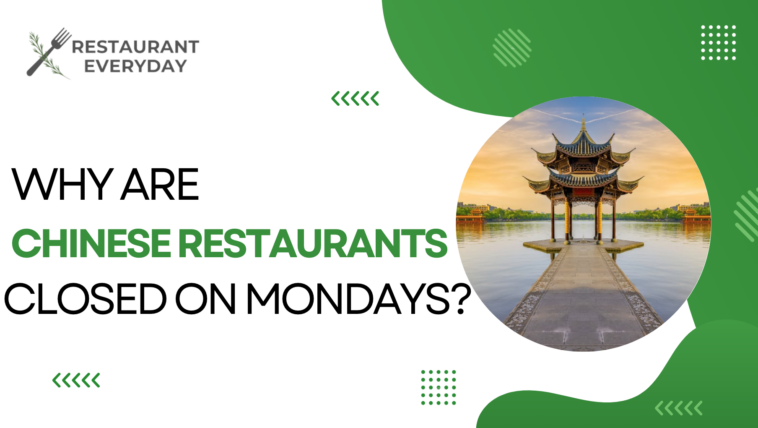Intro:
Discover the intriguing tradition behind the closure of Chinese restaurants on Mondays, blending cultural heritage, culinary excellence, and strategic management.
Key Takeaway: Chinese restaurants close on Mondays due to a combination of cultural significance, supply chain logistics, staff rest, economic efficiency, and adherence to tradition.
Why are Chinese restaurants closed on Mondays?
Chinese restaurants close on Mondays due to cultural significance, restocking fresh ingredients, providing staff with a day off, managing costs efficiently, and honoring traditional practices.
The Mystery of Monday Closures of Chinese Restaurants
Why are Chinese restaurants closed on Mondays: In the world of culinary delights, an intriguing mystery often unfolds on the first day of the week – Monday. Across various locales, a peculiar trend has emerged, especially within the realm of Chinese restaurants: the enigmatic closure on Mondays. A problem that prompts questions and sparks curiosity among both seasoned food enthusiasts and casual diners alike.
As the sun rises on Monday mornings, one may find the doors of many Chinese establishments firmly shut, leaving patrons puzzled and craving their favorite dishes until the restaurant’s eventual reopening. The phenomenon, though not universal, has woven itself into the fabric of dining experiences in specific communities, adding an extra layer of mystery to the beginning of the workweek.
What secrets lie behind this peculiar tradition? Is it a cultural homage, a strategic business decision, or perhaps a culinary ritual passed down through generations? To unravel the mystery of Monday closures, one must delve into the realms of restaurant management, cultural practices, and the ebb and flow of the culinary world. Join us as we seek to uncover the reasons behind the closed doors of Chinese restaurants every Monday – a mystery that tantalizes taste buds and piques the curiosity of those hungry for answers.
Historical Origins: Cultural Traditions and Superstitions
To understand the mystery of Monday closures in Chinese restaurants, one must delve into the historical origins deeply rooted in cultural traditions and superstitions. The decision to close on Mondays often reflects a nuanced blend of beliefs that have been passed down through generations, shaping the practices of these establishments.
1. Cultural Significance of Mondays:
In traditional Chinese culture, certain days of the week hold special significance. Monday, being the first day of the workweek, is seen as a day for renewal and preparation. Closing on Mondays may stem from a desire to take a collective breath after the weekend rush and ensure that the restaurant is ready to offer the best experience to patrons throughout the rest of the week.
2. Astrological and Feng Shui Influences:
Chinese culture places great importance on astrology and Feng Shui, the ancient practice of harmonizing individuals with their surrounding environment. Some restaurant owners may choose to align their business decisions, such as operating hours, with auspicious dates and times, as dictated by these traditions. Closing on Mondays could be a strategic move to adhere to favorable cosmic energies.
3. Superstitions Surrounding the Start of the Week:
Superstitions often play a role in shaping cultural practices. In Chinese folklore, the start of the week is believed to set the tone for the rest of the days. Closing on Monday may be a precautionary measure to avoid any negative energies associated with the beginning of the week, ensuring a smooth and prosperous operation for the remainder of the days.
4. Rest and Rejuvenation:
Beyond superstitions, there is a practical aspect to closing on Mondays. Restaurateurs recognize the importance of providing their staff with a day of rest and rejuvenation after a busy weekend. This not only contributes to the well-being of the employees but also ensures that they are ready to deliver top-notch service during the bustling days ahead.
In unraveling the historical tapestry of Monday closures, one finds a rich interplay between cultural beliefs, astrological considerations, and practical business strategies. It is this amalgamation of tradition and pragmatism that adds a layer of mystique to the culinary landscape, inviting patrons to savor not only the flavors on their plates but also the cultural narratives that shape the dining experience.
Supply Chain and Fresh Ingredients
The mystery of Monday closures in Chinese restaurants also originates in the intricate web of supply chain dynamics and the quest for fresh, high-quality ingredients. Restaurants, including Chinese establishments, often operate on a schedule that aligns with the availability and freshness of their key ingredients.
1. Weekend Supply Challenges:
The weekend, especially Sundays, can pose challenges in terms of the availability of fresh produce and other essential ingredients. Many suppliers and markets may have limited operating hours or reduced deliveries on Sundays. As a result, Monday closures allow Chinese restaurants to replenish their stock and secure the finest ingredients for the upcoming week.
2. Quality Assurance and Culinary Excellence:
Chinese cuisine, renowned for its emphasis on fresh and flavorful ingredients, places a premium on the quality of produce. Restaurants may choose to close on Mondays to uphold their commitment to culinary excellence. This strategic pause in operations allows them to carefully source the best ingredients, ensuring that each dish maintains its authenticity and taste.
3. Efficient Supply Chain Management:
Closing on Mondays is, in part, a reflection of efficient supply chain management. By designating a specific day for restocking, restaurants can streamline their operations and reduce the risk of ingredient shortages during peak days. This approach contributes to a more sustainable and reliable supply chain, ultimately benefiting both the restaurant and its patrons.
4. Minimizing Food Waste:
Another consideration in the decision to close on Mondays is the effort to minimize food waste. By aligning their operations with the ebb and flow of ingredient availability, Chinese restaurants can optimize their inventory and reduce the likelihood of excess perishable items going unused. This not only supports financial sustainability but also aligns with broader environmental concerns.
In the intricate dance between culinary artistry and supply chain logistics, the closure of Chinese restaurants on Mondays emerges as a well-calibrated strategy. It showcases a commitment to providing customers with the freshest and highest-quality dining experience while navigating the challenges inherent in the dynamic world of food sourcing and distribution. As patrons savor the flavors of their favorite dishes, they become unwitting participants in a culinary journey guided by the rhythms of the supply chain.
Labor and Rest for Restaurant Workers
Beyond cultural traditions and supply chain considerations, the mystery of Monday closures in Chinese restaurants is intimately tied to the well-being of the restaurant workers. The decision to close on Mondays often reflects a commitment to providing employees with essential rest and recovery.
1. Rest Day for Staff:
Operating a restaurant is demanding work, particularly during busy weekends. Many Chinese restaurants close on Mondays to give their staff a dedicated day off. This practice acknowledges the physical and mental toll of the restaurant industry, providing employees with valuable time to rest and spend with their families.
2. Work-Life Balance:
In an industry known for its challenging schedules and long hours, prioritizing work-life balance is crucial. Closing on Mondays allows restaurant workers to enjoy a consistent day off, fostering a healthier work environment and contributing to higher job satisfaction. This, in turn, can lead to lower turnover rates and a more motivated and engaged staff during operational days.
3. Reducing Burnout:
Restaurant work can be physically and emotionally demanding, and Burnout is a genuine concern. By instituting a regular day of closure, Chinese restaurants aim to mitigate Burnout among their staff. This proactive approach to employee well-being is not only ethical but also has the potential to enhance overall productivity and the quality of service provided.
4. Operational Efficiency:
Structuring the week with a day off can also contribute to operational efficiency. Staff can use the day to engage in training, conduct maintenance, and prepare for the week ahead. This strategic pause allows the restaurant to start the week with a well-prepared team and a smoothly functioning establishment.
In essence, the closure on Mondays is a compassionate and pragmatic response to the demanding nature of the restaurant industry. It underscores the recognition that the people behind the scenes, from chefs to servers, play a crucial role in delivering a favorable dining experience.
By prioritizing the well-being of its workforce, a Chinese restaurant that closes on Mondays seeks to create a sustainable and supportive environment for its employees, enriching not only their lives but also the overall dining experience for patrons.
Economic Factors and Customer Patterns in the Restaurant Industry
In addition to cultural traditions, supply chain considerations, and labor management, economic factors and customer patterns also contribute to the mystery of Monday closures in Chinese restaurants.
1. Demand Fluctuations:
The demand for dining out often follows a predictable pattern, with weekends being peak times. By closing on Mondays, Chinese restaurants strategically navigate these demand fluctuations. This allows them to maximize profits during high-demand periods and allocate resources efficiently. Closing on a typically slower day helps to balance the books and optimize staffing levels.
2. Cost Efficiency:
Operating a restaurant involves various costs, including labor, utilities, and rent. Closing on Mondays can be a cost-saving measure, as it allows businesses to reduce overhead expenses during a day when customer traffic might be lower. This cost efficiency contributes to the overall financial sustainability of the restaurant.
3. Strategic Planning for the Week:
Mondays are often used as a day for strategic planning. Restaurant owners and managers can use this time to review performance metrics from the previous week, plan marketing strategies, and make adjustments to menu offerings. This proactive approach contributes to the restaurant’s long-term success by ensuring that it remains agile and responsive to customer preferences.
4. Customer Behavior and Expectations:
Over time, customers may come to expect specific patterns from their favorite restaurants. If a Chinese restaurant consistently closes on Mondays, patrons may adjust their dining plans accordingly. This aligns with the principle of setting clear expectations for customers and avoiding potential disappointment if they find the restaurant unexpectedly closed.
5. Community and Industry Norms:
In some areas, the practice of closing on Mondays might be a community or industry norm. Restaurants often observe the operating hours of their competitors and neighboring establishments to remain in sync with local expectations. This alignment with community norms can help create a sense of predictability for customers.
By strategically aligning their operations with economic factors and customer behavior, Chinese restaurants that close on Mondays aim to strike a balance between meeting customer demand and maintaining a sustainable business model. This careful orchestration reflects a nuanced understanding of the dynamic relationship between restaurant economics and the preferences of their patrons.
Tradition and Adherence to Customary Practices
The thread of tradition and adherence to customary practices stands out in the tapestry of the mystery surrounding Monday closures in Chinese restaurants. Cultural rituals and longstanding customs play a pivotal role in shaping the operating schedules of these establishments.
1. Cultural Respect and Continuity:
Chinese culture places a significant emphasis on tradition and respect for customs. The decision to close on Mondays may be a reflection of a longstanding cultural practice that transcends generations. Restaurants may see this as a way to honor their heritage, paying homage to the customs that have been passed down through families or communities.
2. Familial and Communal Ties:
Chinese restaurants, often family-owned or deeply connected to a particular community, may view Monday closures as a means to strengthen familial and communal ties. This day off allows restaurant owners and staff to spend quality time with their families and engage in communal activities, fostering a sense of unity and shared identity.
3. Ceremonial and Ritualistic Significance:
Mondays, in the context of Chinese cultural beliefs or specific traditions, may hold ceremonial or ritualistic significance. Closing on this day could be a way for restaurants to observe certain practices, whether related to religious rituals, cultural ceremonies, or other customary observances.
4. Preserving Culinary Authenticity:
Many Chinese restaurants take pride in preserving the authenticity of their culinary offerings. The decision to close on Mondays may be rooted in a desire to uphold traditional cooking methods, use authentic ingredients, and ensure that the recipes remain true to their cultural origins. This dedication to authenticity contributes to the unique and genuine dining experience offered by these establishments.
5. Creating a Distinct Identity:
Establishing a distinctive identity in a competitive culinary landscape is crucial for the success of any restaurant. For Chinese restaurants, adhering to customary practices such as closing on Mondays can set them apart, creating a sense of uniqueness that resonates with customers seeking an authentic and culturally rich dining experience.
Read Also: Can you Sue a Restaurant for Food Poisoning
In unraveling the mystery, one finds that tradition and adherence to customary practices serve as a guiding force for Chinese restaurants. The decision to close on Mondays is not merely a logistical or economic choice; it is a deliberate embrace of cultural heritage, community bonds, and timeless rituals that infuse depth and authenticity into the culinary journey.
Conclusion: Why are Chinese restaurants closed on Mondays?
In the symphony of flavors that Chinese restaurants orchestrate, the enigma of Monday closures adds a distinctive note, resonating with cultural echoes, supply chain intricacies, labor considerations, economic strategies, and the continuity of tradition.
The decision to close on Mondays is a nuanced dance between honoring cultural practices, ensuring the freshness of ingredients, prioritizing the well-being of staff, and navigating the ebb and flow of customer demand. It is a culinary journey woven with threads of tradition, economic pragmatism, and a commitment to authenticity.
As patrons savor the delectable offerings of their favorite Chinese establishments, they unknowingly partake in a rich tapestry of culture and culinary craftsmanship—one that embraces the past while innovatively shaping the future of the dining experience. The mystery of Monday closures invites diners to savor not just the flavors on their plates but the profound stories and traditions that make each meal a cultural celebration.
People May Also like to Read: What are Bioengineered Food Ingredients




